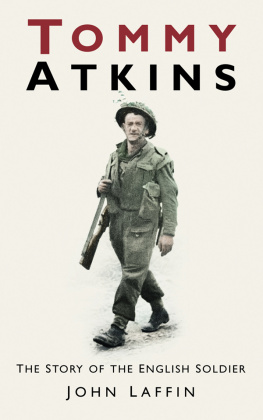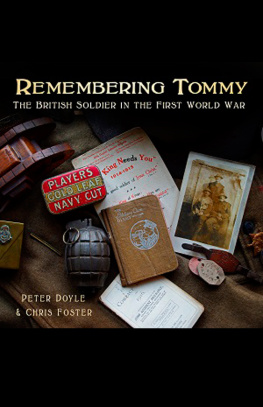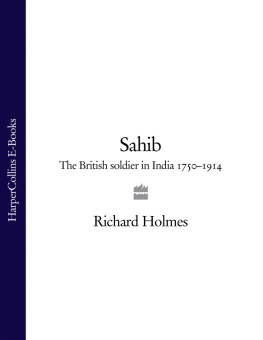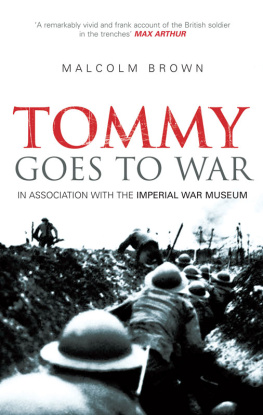TOMMY
ATKINS
THE STORY OF THE ENGLISH SOLDIER
To those millions of Tommies whose bones lie abroad, in a thousand fields I dedicate this monument
TOMMY
ATKINS
THE STORY OF THE ENGLISH SOLDIER
JOHN LAFFIN

First published in 1966
This edition published in 2011
The History Press
The Mill, Brimscombe Port
Stroud, Gloucestershire, GL5 2QG
www.thehistorypress.co.uk
This ebook edition published in 2016
All rights reserved
The Estate of John Laffin, 2003, 2004, 2011
The right of John Laffin to be identified as the Author of this work has been asserted in accordance with the Copyrights, Designs and Patents Act 1988.
This ebook is copyright material and must not be copied, reproduced, transferred, distributed, leased, licensed or publicly performed or used in any way except as specifically permitted in writing by the publishers, as allowed under the terms and conditions under which it was purchased or as strictly permitted by applicable copyright law. Any unauthorised distribution or use of this text may be a direct infringement of the authors and publishers rights, and those responsible may be liable in law accordingly.
EPUB ISBN 978 0 7524 6694 1
Typesetting and origination by The History Press
eBook converted by Geethik Technologies
Contents
Tommy Atkins
T he origin of Tommy Atkins as a sobriquet for the English soldier is still disputed. A widely-held belief is that the Duke of Wellington chose the name in 1843. But Lieutenant-General Sir William MacArthur, writing in the Army Medical Services Magazine, says that the War Office used the name Thomas Atkins as a representative name in 1815. Specimen forms of the Soldiers Book, issued for both Cavalry and Infantry that year, bore against the space for the soldiers signature: Thomas Atkins, his X mark. As education improved his X mark was omitted.
However, the phrase Tommy Atkins was in use before 1815. A letter sent from Jamaica in 1743, long before Wellington was born, referred to a mutiny among hired soldiery there and said: Except for those from N. America [mostly Irish Papists] ye Marines and Tommy Atkins behaved splendidly.
About the same time, incidentally, the English soldier was known as Thomas Lobster, because of his red coat. A reference to Thomas Lobster and John Tar is to be found in The Craftsman, 12 April, 1740.
Wellingtons use of Thomas Atkins is said to have been inspired by a battlefield incident in September 1794 when Wellington, then Arthur Wellesley, led the 33rd Foot, which formed part of General Abercrombys brigade, in action against the French at Boxtel in the Netherlands. French infantry pressed the brigade hard and their cavalry waited for the order to charge. Wellesley, in reserve with his battalion, moved his companies hinge-wise to allow the beaten battalions to pass through, then form line again. The 33rd fired three volleys, advanced with the bayonet and broke the French. After the action Wellesley noted among the wounded the right-hand man of the Grenadier Company, a fine, efficient soldier of 6ft 3in, a man of twenty years service. Now he was dying of three wounds a sabre-slash in the head, a bayonet thrust in the breast and a bullet through the lungs. He looked up at Wellesley and apparently thought that his young commander was concerned, for he said, Its all right, sir. Its all in the days work. And then he died.
The mans name was Private Thomas Atkins and his passing is said to have left such an impression upon Wellington that when he was Commander-in-Chief he remembered the name and used it as a specimen on a new set of soldiers documents sent to him at Walmer Castle for approval. It makes a fine story, especially as the dying mans last words could well be a motto for the British Army. But, though repeated by many historians, the story does not appear to prove that Wellington was the first to use the name, but merely that he gave it more popular currency.
Many other more fanciful stories exist. In 1900, Revd E.J. Hardy, an Army chaplain, gave what he described as a truer derivation. At the time of the Indian Mutiny in 1857, when rebellion broke out at Lucknow, all Europeans fled to the Residency for protection. On their way the met a private of the 32nd Regiment (Duke of Cornwalls Light Infantry) on duty at an outpost. Many civilians urged the soldier to get away while he could, but he said he must remain at his post. And he died there. His name happened to be Thomas Atkins, wrote Mr Hardy, and so, throughout the mutiny campaign, when a daring deed was done, the doer was said to be a regular Tommy Atkins.
Whatever the true origin of the name, it is peculiarly suitable, both in euphony and Englishness. For this reason I have used it throughout this book, even though it was certainly not in use during the earlier part of the period my account covers.
Significantly, no English officer has ever thought of himself as a Tommy Atkins, nor has the public mind ever associated the sobriquet with officers. This is in contrast to, say, the Australian officer who prefers to be called a Digger, in common with his men. The English are the only race to give their soldiers as a nickname a Christian and surname complete. The nearest approach is Jock, for the Scottish soldier.
_________
Quoted in Soldier Magazine, April 1949.
About the time of the Crimean War (18455) tommy was the soldiers term for brown bread.
Three Centuries of Opinion
N ot everybody has found the English soldier and the British Army subjects for praise and even some of the most favourable comments have been spiked with forthright criticism. I have selected the following appraisals as much for their representative value as for what I consider to be their aptness. The object of this book is to show that there is some truth in all of them. Except for the first two, the opinions are listed in order of the periods of dates to which they refer. All the comments are noteworthy; the first two are specially so, because they express the opinions of men who are in some ways the most successful and famous of their respective races Wellington and Rommel.
They are the scum of the earth and it is really wondeful that we should have made of them the fine fellows they are. With such an army we can go anywhere and do anything.
Wellington: referring to his own army in Spain, Portugal and France, 180814.
That day the Guards Brigade had evacuated Knightsbridge, after the area had been subjected all the morning to the combined fire of every piece of artillery we could bring to bear. This brigade was practically a living embodiment of the positive and negative qualities of the British soldier. An extraordinary bravery and toughness was combined with a rigid inability to move quickly.
Rommel, Papers, 13 June, 1942, four months before the Battle of El Alamein.
An English army of the 14th century, unlike its French counterpart, was the mirror of a nation, not a class. There now appeared for the first time upon the battlefields of the continent that steady British infantry, drawn from the humbler regions of society, which again and again has disconcerted the calculations of brilliant commanders.
Dr H.A.L. Fisher, History of Europe.
Of the English I would say, they stand by one another, and are often seen to die together. They are spirited and have plenty of boldness... They are brave in fighting and full of resolution. They are the best of archers. Abroad, if things are going in favour of the enemy, they preserve good military descipline; and at all times are jovial yet quick in pride.
Next page












